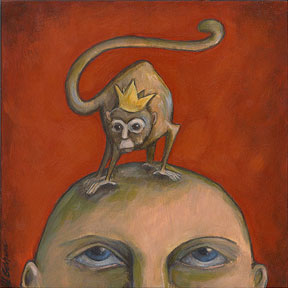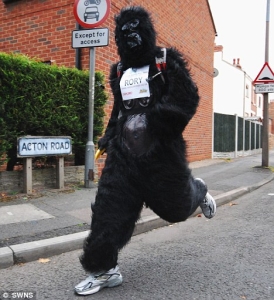Marathon Mind Monkeys
Have you ever run a marathon and hit the wall? Or perhaps gone on a long training run and ended up stumbling through the final few miles? Maybe you’ve found yourself complaining about the huge crowds at a race, or wishing you had worn different running shoes, or becoming upset at the smelly runner in front of you who really should have taken a bath sometime in the past week.
It’s in these unhappy moments when the Marathon Mind Monkeys show up, and there is a very good chance that something will happen that causes you to meet them if you run a long distance event.
 “Mind monkeys” is, of course, simply a metaphorical phrase. When you begin to experience negativity creeping into your thinking, you might jokingly say that the mind monkeys have taken over. Your thoughts are your own responsibility, but during a marathon, it’s not uncommon to begin to feel as if you are unable to control your own emotions and thoughts. The mind monkeys infect you with sadness, anger, despair, even depression.
“Mind monkeys” is, of course, simply a metaphorical phrase. When you begin to experience negativity creeping into your thinking, you might jokingly say that the mind monkeys have taken over. Your thoughts are your own responsibility, but during a marathon, it’s not uncommon to begin to feel as if you are unable to control your own emotions and thoughts. The mind monkeys infect you with sadness, anger, despair, even depression.
This lack of ability to control the mind is often part of the larger physiological phenomenon known as “hitting the wall”. When glycogen stores reach a dangerous level of depletion, various effects occur on a runner, one of which may be a harsh visit from the mind monkeys. You may become discouraged and feel hopeless. You might become angry at your body’s inability to perform at normal levels. Some runners lash out at volunteers or spectators. Some drop out of the race, too discouraged to go on.
There are other times when emotions and thoughts turn negative during a marathon. Runners expecting aid stations might become upset when water runs out or gels are not available. Inconsiderate fellow racers can jostle, trip, force you off course, spit on you, or annoy you with their musical choice. The food you ate the night before may not be digesting well. Traffic or other problems can interrupt the race (I’ve been stopped by a trains, emergency vehicles, and fallen runners). As with life in general, factors beyond your control can cause trouble.
I’ve run enough marathons to experience the mind monkeys many times. It’s very likely I’ll meet them again, but hopefully without disastrous results. Here are a few techniques that I have learned to use to help keep the mind monkeys away, as well as deal with them when they do arrive:
• Acknowledge before you start that no matter how careful you have been, the race may not go according to plan.
• Learn your body’s fueling needs and try to eat and drink accordingly.
• If you find thoughts taking a dark turn, or begin to feel sad or angry, pretend it’s not you but the Marathon Mind Monkeys causing it – and tell them to go away.
• Don’t allow sad songs or angry music to dominate your mind. Have a super-motivational song ready to go (on your device if you carry one, or in your memory if you don’t), and let it out when necessary.
• Take advantage of the spectators. Many will have motivational signs and cheer loudly – pay attention to them and let their cheerfulness pull you forward.
• Don’t stop. You can’t let them win. Slow down, but relentless forward motion is necessary to beat the mind monkeys.
• Shake your arms, or raise them up. Grit your teeth. Clench your fists. Grunt, or even try to roar out loud. This redirects some blood flow to other muscles than your legs, and the change can be surprisingly refreshing to your brain.
• Try to talk to a nearby runner. Ideally, say something encouraging to them. The mind monkeys don’t like positive talk, but negative talk and complaining will reinforce them.
You may develop other ways to fend off the mind monkeys. Whatever you do, be sure to recognize that the visit is temporary and eventually you will be back to your normal self. If you handle them properly, they will quickly go away and you’ll be able to finish your race feeling strong.



